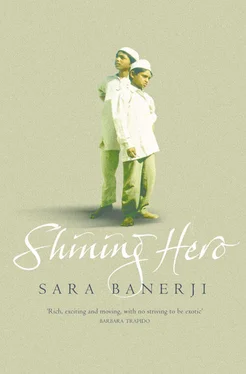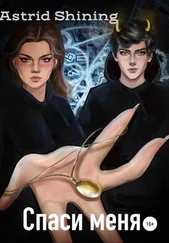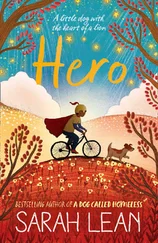‘The wife of the misti wallah has a trouble and needs your help,’ someone told her. Shivarani followed him.
The misti wallah’s wife was sitting on bolsters in the room at the back of the shop, pressing shandesh into little wooden moulds in the shape of fishes. The room smelled of sugar and buzzed heavily with bees and flies and the misti wallah’s back was visible through the bamboo curtain, as he sat cross-legged behind his piles of sweets.
‘I want my eldest sons, Rahul and Ravi, to go to school, but instead they are thieving around the village and their father does nothing to stop them,’ said the woman. ‘Ravi is the leader, and Rahul, though the eldest, follows him. I want the best for our children and my husband says he does too, but it costs money and the attention of the father to bring up children properly.’
The misti wallah’s back flinched as though he heard or guessed what his wife was saying about him. He worked very hard, getting up before sunrise to separate the curds and set the dahis. For hours, even on the hottest days he would be toiling over a vat of hot oil, dribbling in the batter to make jellabies, then dropping the hot crisp squirls into simmering sugar syrup. After his stall opened he would be sitting there all day long, serving customers with rosogullas, Lady Kennies, gulab jamans, shandesh. Spooning almond-spiked paishes and rose-flavoured kheers into terracotta pots. Packing jellabies into banana leaf and tying the bundle with thread. Even after the stall was closed his work would still not be finished. He would still have to seal the jars of warm curd with muslin and waxed paper before carrying them to the river to cool all night in the shallows there. The evenings in the drink shop were his relaxation. He looked forward all day to the hour when he would be able to sit in silence in the little concrete room of the arrak shop and down a few tumblers of arrak. Then, fully drunk, his worries about his out-of-control sons and his wife’s complaints forgotten, he would stagger home and sleep.
The misti wallah, on his way to the arrak shop, would sometimes pass the bullock cart on which his wife and children were squashed among the other villagers, on their way to see the film at Dattapukur. His wife, like the other women, wearing her brightest sari and with jasmine in her hair, his sons wearing oversized shorts, with their hair greased down and behaving properly for once, crammed among little girls in frocks embroidered with glittering thread and men in starched pyjamas. ‘Why don’t you come with us instead of getting drunk,’ his wife would cry as he squeezed onto the verge to let the cart rumble by. ‘The cinema will not give a headache and tonight is one very good film.’
Later, at the arrak shop, the misti wallah would settle onto the cool cement seat, glass in hand, and hear the shrill excited laughter and the creaking of the axle receding, as the cart made its way out of the village, and feel grateful for the silence that followed the departure of his family.
‘My children are getting a bad example,’ said the wife as she began to shake the shandesh fishes from their moulds and decorate them with silver leaf. ‘That must be the reason for their bad behaviour but I am hoping that, since you are college returned and therefore of a great cleverness, you will speak with my husband and ask him to desist from the drinking of arrak, and come instead to the cinema with us.’
The zamindar’s son, Pandu, had taken Koonty all down the long gallery, telling her about the family portraits. And now they sat on the verandah drinking nimbu pani with ice. Although he was so much older he talked to Koonty as though she was as grown-up as him, telling her of his plans to bring the Hatibari back to its former glory. ‘In the days of my grandfather there were fifty servants, and all the land you see in every direction belonged to our family.’ He was planning to buy a herd of Jersey cows, he told Koonty. ‘There are all these stables that my grandfather used for his pig-sticking horses and they will make good byres.’ He brought out photo albums. ‘Look how pretty my great-grandmother was. And this aunt, see her. Isn’t she beautiful? Though not as beautiful as you.’
Koonty felt a heat in her cheeks and, unable to work out how a modest woman was supposed to respond to such a compliment, said nothing. Kuru Dadoo, who was Pandu’s father, joined them and, pointing to a faded sepia photo, said, ‘That is me on the day I saved the life of a Calcutta box wallah. I was a hero in my time though you wouldn’t believe it now.’ Then he laughed till his big stomach shook, pinched Koonty’s cheek till it was sore and popped a sweetie in her mouth as though she was a little girl and not a woman of thirteen and said, ‘I hope you will be visiting us often because I need a pretty little girl around.’
Meena Gupta became very excited and hopeful when she heard of the visit. And a few days later when Koonty was invited round again Meena went nearly hysterical with hope. Kuru Dadoo had talked of Koonty’s marriage with Pandu.
‘Tell me word for word what he said.’
‘I’ve told you twenty times and I’m not going to say it any more,’ cried an exasperated Koonty.
‘Once more,’ pleaded the mother. These words were music to her after the dreadful business of Shivarani.
‘He said, “If she was a little less jungly and a bit more modest Koonty would make a suitable bride for you, Pandu,” but he might have been only joking. I don’t think he really meant it. And anyway I don’t want to be married. I want to go on being as I am.’ Being as she was consisted of swimming in the river with Pandu and his boy cousins or even going with them into the village and playing games of cricket with the village boys in the main street.
‘All this must stop instantly,’ said Meena, who felt as though Koonty had grown up into a young woman in a moment, and without anyone noticing. Whatever could she have been thinking of to let things come to such a pass? She forbade all further visits to the village, and put a stop to meetings with the Pandava and Kaurava boys unless there was a chaperone present. Koonty cried and begged, but Meena was filled with terror mixed with a marvellous hope.
Shivarani had managed to solve a few of the village’s problems. She had got money from Oxfam to dig a tube well, and had started a little industry for the fourteen widows. They now made blue-eyed, yellow-haired dolls which Shivarani sold to a Calcutta toyshop. But Meena was not impressed. ‘What is this, going around all day among those dirty people? I think that you are stirring up trouble where no trouble was before, and sooner or later it will come to the ears of the zamindar. Do you want your father to lose his work here? Then you will be in the state of these poor people of Hatipur that you are so sorry about.’
‘Don’t listen to Ma,’ Koonty tried to console. ‘I think it’s wonderful, all the things you are doing. I wish I was a good person like you but I just couldn’t do it. I know I couldn’t.’
When Koonty was nearly fifteen Pandu’s mother formally requested the union in marriage of Koonty with her son Pandu. Meena, nearly fainting with joy, reflected that the last year of Koonty’s sulks and rows had been a small price to pay for this wonderful reward.
Koonty now spent her days moping alone in the garden while the boys rushed around on their bicycles or went swimming in the river. ‘Of course you may not swim. Have you forgotten you are to be the wife of the young zamindar?’ ‘Certainly you may not go on a bicycle. That is not at all a suitable behaviour for a bride-to-be.’
Sometimes Shivarani, feeling sorry for her lonely sister, would sit with her and brush Koonty’s hair or rub mustard oil into her fingers, while Koonty told her sister the story of the latest film she had seen. ‘The Mahabharata. And the Sun God is absolutely gorgeous, though the one I like best of all is Arjuna. I’ve got a poster of him on my wall.’ Shivarani would tell Koonty about the things that were happening in the village, how Ravi, the misti wallah’s son, had broken the darjee’s sewing machine, how Laxshmi had given birth to a daughter and her husband had left her and how she was having difficulties in getting the doll shop to pay up. ‘The widows need the money so badly. You have no idea how poor they are. It’s not just a matter of having to wear white and being forbidden jewels. Their husbands’ families treat them as though surviving their husbands is a punishable offence.’
Читать дальше











